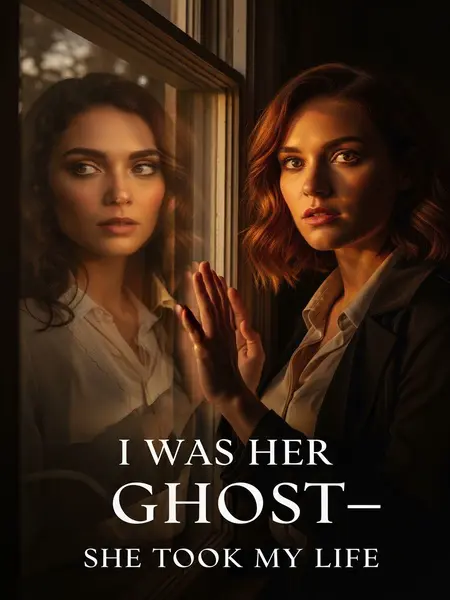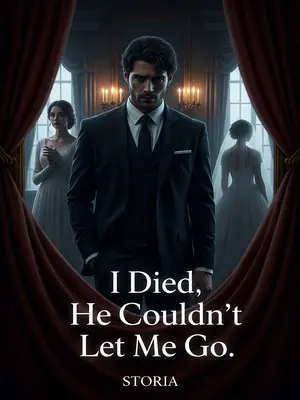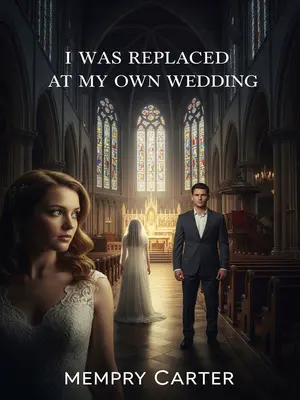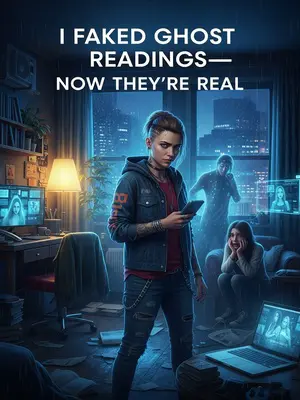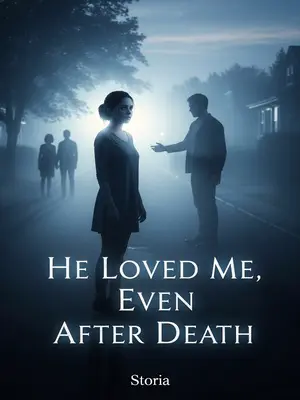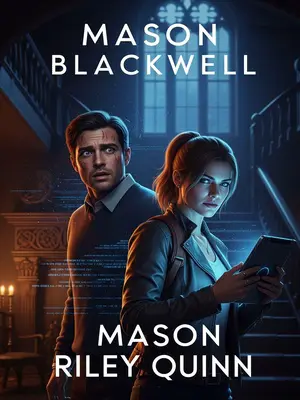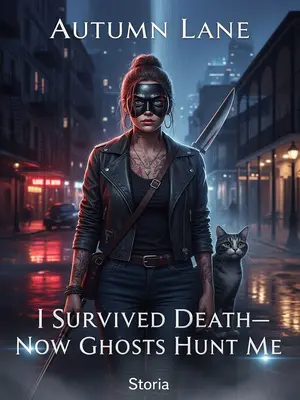Chapter 1: Stolen Names, Shattered Fates
The seventh year—the year my life was stolen by a stranger from another world.
In that seventh year, everything shifted. The world kept turning, but for me, it felt as if time had fractured—stopping and then lurching forward again. In Maple Heights, the air grew heavy, thick with memories, as if the changing seasons themselves had taken on my troubles.
That was the year Caleb Whitaker broke off his engagement to her.
And of course, he did it in the most public way possible—right at the annual Maple Heights Fall Festival, right in front of the courthouse steps. God, the memory still stings. I can still see the way the crowd fell silent, everyone pausing as he handed her back the ring. In a small town, no one ever forgets a scene like that.
Her child was run over by a pickup truck.
A single, shattering moment—a screech of tires, the metallic tang of blood on the blacktop. The world shrank to that spot: bystanders frozen, the child’s tiny shoe lying in the gutter. That memory haunts me, rising up at the strangest times, like a song you can’t get out of your head no matter how much you want to.
I held her bruised, battered body and whispered, “Hey, this time, let me protect you.”
I held her tight, feeling her shudders, the scent of iron and dust tangled in her hair. My voice was barely a breath, but I meant every word. Streetlights flickered above, shadows stretching long, and I promised her—this time, she wouldn’t face it alone.
My name is Autumn Lane. Autumn, like the season, or maybe like a gentle smile.
It’s a name that always felt more like a hope than a fact—something someone wished for me. Autumn Lane. The kind of name you’d find in a storybook, or maybe on a mailbox on a quiet street, leaves swirling around the curb come October.
But it wasn’t always this name. The owner of the Rosewood House said I used to be called ‘Autumn.’
Funny how names change meaning depending on who says them. At the Rosewood House, everyone called me Autumn, but there was always a heaviness—a kind of history you can’t wash away, no matter how many times you try to start over.
For a long time, Autumn meant something else—resentment.
That’s how it felt, for years. Like my whole life was colored by choices I never made but had to live with. It’s strange how a name can carry so much sorrow, so much pain that no one talks about.
It was the name given to me by the previous star of the Rosewood House, Mariah Holloway.
Mariah Holloway—her name still lingers in the halls, whispered by the old walls and the creaking floorboards. She was the kind of woman who left her mark on a place, even long after she was gone.
You want to know who Mariah Holloway is?
People in Maple Heights never really forgot her. She was a legend here—the kind of woman who could silence a room with a single look, whose laughter would float from the porch late at night. In this town, everyone knows the name Mariah Holloway.
She was my mother, once the headliner of the Rosewood House.
It’s a strange thing to inherit—a mother who was the star of a place like the Rosewood House. Folks would whisper about her in the grocery store, in the church pews, and I’d pretend not to hear. But I always did.
Why 'former'?
Because after she left the house to become the mistress of a wealthy businessman, she lost her place at the top.
She traded the bright lights and applause for a mansion on the edge of town, but the world never let her forget where she came from. In Maple Heights, people remember everything, and forgiveness is hard to come by.
What’s so great about being someone’s mistress? It’s improper, looked down on by nearly everyone.
Even as a kid, I picked up on the way folks looked at her—some with envy, most with scorn. It was the kind of thing that clings to you, like cigarette smoke in your hair. She thought she was escaping, but she just traded one cage for another.
Of course, she regretted it and came back to the madam, holding me—a newborn—in her arms.
It was raining that day, a slow, soaking drizzle that seeped into your bones. She stood on the porch, drenched and clutching me tight, her pride stripped away. The madam’s eyes softened just a little when she saw the bundle in her arms.
The madam didn’t treat her kindly—she spat at her. But when she saw the swaddled baby, she couldn’t help but feel a pang of pity.
The madam was tough, but not heartless. Her spit hit the porch, but her eyes stayed on me, small and helpless. She muttered about fools and second chances, but she let us in.
She came back, but she was no longer the star she’d once been.
The Rosewood House had moved on—new faces, new favorites. My mother faded into the background, a shadow of who she used to be. But she stayed, because there was nowhere else to go.
Here, my mother was just 'Mariah'—the woman who dressed up the glamorous girls, at the very bottom.
She became the woman who ironed dresses and fixed makeup, her hands always busy, her eyes always tired. She moved through the halls quietly, as if she didn’t want to disturb the ghosts of her own past.
She hunched her back, working beside those perfectly made-up women. I remember how small she looked then.
I’d watch her from the doorway, her shoulders bent, fingers stained with dye and powder. She rarely spoke, except to scold or sigh. The other girls gossiped, but she just kept her head down.
The madam looked at her with both sorrow and resentment: “If you hadn’t run off back then, maybe you’d still be the most popular now.”
Sometimes I’d catch the madam staring at her, the words hanging heavy in the air. Regret and anger mingled in her voice, the way old wounds never really heal. It was a conversation they’d had a hundred times, in a hundred different ways.
But there are no ‘what ifs’ in life.
That’s what I learned, watching them. No matter how much you wish things could be different, life just keeps moving. The past is a ghost that follows you, always whispering what might have been.
She hated the man who abandoned her, and she hated me.
Sometimes I saw it in her eyes—a flicker of something dark, aimed right at me. I was the living reminder of everything she’d lost. Even as a child, I felt the weight of her resentment.
Many times, she wanted to throw me—just a baby—to the ground. There were nights when her anger boiled over, her hands trembling as she held me. I never understood it then, but looking back, I see how close I came to being lost.
If the madam hadn’t stopped her, maybe I wouldn’t be here anymore.
The madam was always there, sharp-eyed and quick. She’d step between us, her voice firm, reminding my mother that some lines just can’t be crossed. I owe her more than I can ever say.
So, I am Autumn.
That name was my inheritance, for better or worse. It carried all the weight of my mother’s choices, all the bitterness she couldn’t let go of.
Autumn, as in resentment.
Every time someone called my name, I heard the echo of her anger. It was a constant reminder that I was both loved and resented, wanted and unwanted.
She resented that man, and she resented me.
I spent my childhood trying to make myself small, hoping if I was quiet enough, she’d forget to be angry. But resentment is a stubborn thing—it clings to you, even when you wish it wouldn’t.
When I turned seventeen, she was still bitter and unhinged.
Seventeen should’ve been a new beginning, but for me, it was just more of the same. My mother’s bitterness had only deepened, her moods swinging like a pendulum.
Her once beautiful face had faded.
The lines on her face told stories of late nights and broken dreams. Her eyes, once bright, were now dull and distant. I hardly recognized her anymore.
In the past, some old regulars would come to see her and sigh.
They’d linger in the parlor, their voices hushed, remembering the woman she used to be. Some would slip her a bill, others just shook their heads and walked away.
Now, as an old and crazy woman, no one paid attention anymore.
She became invisible, just another ghost haunting the halls. The new girls barely glanced her way, and the old regulars stopped coming altogether.
Some nights, she seemed to lose her grip on reality, wandering the halls, muttering to herself.
She’d pace the corridors, talking to shadows only she could see. I’d hear her footsteps echoing down the hallway and pull the covers up tight, hoping she’d just keep going.
I always knew.
I always knew she was slipping away, bit by bit. But hope is stubborn—it sticks around, even when you know better.
But I still held onto some hope—after all, she was my mother.
I clung to the memories of better days, the rare moments when she’d smile or hum a tune. I wanted to believe she could come back to me, that we could start over.
Until one night, she dragged me up.
Her hands were rough, her grip unyielding. I woke with a start, fear prickling down my spine. The room was cold, the air heavy with something I couldn’t name.
Her dim eyes stared at me, scrutinizing me like a wolf.
There was a wildness in her gaze, something feral and desperate. She looked at me as if I were a stranger, or worse—a threat.
“You’re that witch! That witch!” she suddenly screamed, tears streaming down her face. “You made the mayor leave me! If not for you, how could he do this!”
Her voice was raw, broken. The words tumbled out, jagged and sharp. I didn’t understand, but the pain in her eyes was unmistakable.
I didn’t understand what she was saying.
I tried to speak, but the words caught in my throat. All I could do was stare back, helpless and afraid.
She was so strong, it hurt.
Her fingers twisted in my hair, pulling hard. I cried out, but she didn’t let go. The pain was sharp, electric, making my eyes water.
She twisted my hair into a knot.
I could feel the roots straining, the burn of tears on my cheeks. I wanted to run, but there was nowhere to go.
“Look at you!” She suddenly dragged me to the mirror. She seemed to realize I was her daughter, but still, she snapped viciously, “It’s because you’re too dumb that he won’t come see me.”
She shoved me in front of the mirror, her grip unrelenting. I stared at my reflection, eyes red and swollen, hair a tangled mess. Her words cut deeper than any bruise.
“He won’t come! How could he not come see me…” She collapsed, as if all her strength had left her.
She slid to the floor, her sobs echoing in the small room. I stood frozen, the weight of her grief pressing down on me. In that moment, I saw how broken she really was.
After that, I fell seriously ill.
The fever hit hard, leaving me bedridden for weeks. The world blurred at the edges, voices drifting in and out like distant radio static. I remember the madam’s cool hand on my forehead, the taste of bitter medicine on my tongue.
The madam took pity on me and said my name could mean something else—not Autumn as resentment, but Autumn as gentle.
She said it softly, like she believed a new name could change my luck. Autumn, like a gentle smile. Maybe it was a new beginning, or maybe just a wish.
The madam was a businesswoman, but she did care for me.
She had a tough shell, but there was kindness in her actions—a warm meal left at my bedside, a blanket tucked around my shoulders. She was the closest thing I had to family.
“It’s all that curse’s fault,” she sighed. “Your mother used to be a decent person. That damn thing ruined you both.”
She shook her head, her voice heavy with regret. In small towns, folks are quick to blame curses or bad luck for what they can’t explain.
“Don’t blame her.” The madam patted my head.
Her hand was rough but gentle, the kind of touch you remember long after it’s gone. “She’s had it hard, honey. Some folks just lose their way.”
“Mariah Holloway was once the most famous girl in Maple Heights.”
The madam’s eyes went distant, lost in memories. “She could light up a room, your mama. Don’t you ever forget that.”
The madam didn’t know that after that, I truly wasn’t Autumn anymore.
Something inside me shifted, like a door closing softly. I wasn’t the same girl who’d grown up in the Rosewood House. The world felt different, and so did I.
How could I resent my mother?
I tried to hold onto the good memories, but they slipped through my fingers like sand. I wanted to forgive her, but the hurt ran deep.
My body was taken over by a girl from another world.
It happened quietly, like a dream you can’t quite remember. One day I was there, the next I was watching from the sidelines, a silent witness to my own life.
She is the real Autumn.
She moved with a confidence I never had, her laughter bright and unburdened. I envied her, more than I wanted to admit.
She is Savannah Lane, whose name would be remembered in stories for generations.
Savannah Lane. The name sounded like music, like the promise of something better. She was the kind of girl who changed the world just by being in it.
Savannah Lane appeared after I fell ill.
She showed up when I was at my lowest, a spark of hope in a world gone gray. She brought with her stories of far-off places, dreams I never dared to dream.
She said she came from another world.
Her eyes would light up when she talked about it—a place so different from Maple Heights, it was hard to imagine. Sometimes I wondered if she missed it, or if she was just making the best of what she had.
Her home was not here.
She’d gaze out the window, lost in thought, the longing in her eyes as clear as day. I wondered what it would be like to belong somewhere so completely.
She described to me such a place—so beautiful.
She painted pictures with her words: city lights twinkling like stars, music drifting from open windows, the smell of fresh bread on every corner. It sounded like a dream, and for a moment, I believed it could be real.
On the street corners, there were bakeries with the sweet scent of cheesecake, her favorite.
She’d close her eyes and smile, remembering the taste of cheesecake—creamy, tangy. Topped with fresh berries. Her favorite.
At first, Savannah didn’t like it here either.
She was restless, always searching for something more. The old house felt small, the town too quiet. She missed the buzz of her old life, the little conveniences she’d taken for granted.
She found it boring, lacking the ‘laptops’ and ‘air conditioning’ she spoke of.
She’d complain about the heat, fanning herself with an old magazine, or grumble about having to write letters by hand. I’d laugh, but I understood. Change is hard, no matter where you come from.
She looked at me, barely hanging on in this body, with sadness in her eyes.
Sometimes I’d catch her watching me, her gaze soft and full of pity. She wanted to help, I could tell. But I didn’t know how to let her.
“You’re not doing well like this,” she shook her head. “Let me help you.”
Her words were gentle, but there was steel beneath them. She was determined to make things better, even if it meant taking on my burdens herself.
She took over my body, and from then on, I watched the years that belonged to her from the sidelines.
It was strange, watching my own life unfold from the outside. I saw things I’d never noticed before—the way people smiled at her, the way she brought light into dark places. It made me proud, and a little envious.
Savannah was a wonderful girl, but she had her own mind.
She didn’t let anyone push her around. If she thought something was wrong, she’d say so—loud and clear. It was a quality I admired, even if it got her into trouble sometimes.
She couldn’t stand my mother’s character.
She’d watch my mother with a mix of sadness and frustration. “No one deserves to be treated like that,” she’d say. “You have to stand up for yourself.”
“This isn’t right,” she said. “To vent your anger on someone innocent is unfair.”
She never sugarcoated anything. She saw things for what they were, and I wished I could be more like her.
She went to the madam, put her own future on the line, and moved my mother to a small house outside the Rosewood House.
It was a bold move, one that shocked everyone. But Savannah stood her ground, insisting it was for the best. Sometimes distance is the only way to heal old wounds.
“Don’t worry too much about her,” she explained to me. “You two might need some distance to live better.”
Her words made sense, even if they hurt. I realized she was right—sometimes love means letting go, at least for a while.
And I made a deal with her, giving her this dull and tasteless life of mine.
I watched as she breathed new life into the world I’d grown tired of. She saw beauty where I saw only routine, hope where I saw despair.
I hoped she could live wonderfully for me.
I wanted her to have the chances I never did. Watching her chase her dreams, I felt a strange kind of happiness—like I was living through her.
Watching her life as a bystander, I didn’t find it boring at all.
Every day was an adventure, full of surprises and small victories. I found myself rooting for her, cheering her on from the sidelines.
She truly was a spirited girl.
She had a spark that couldn’t be dimmed, no matter how hard life tried. People were drawn to her, inspired by her courage and kindness.
Since Savannah agreed to the madam’s request, she did not go back on her word.
She kept her promises, even when it wasn’t easy. That’s the kind of person she was—steady, reliable, someone you could count on.
From that day, she moved out of the staff quarters.
She packed her things in a battered suitcase, her head held high. I wished I could be that brave. The other girls watched her go, some with envy, others with admiration.
The madam gave her a box of dark brow pencils, telling her to dress up well.
“Presentation matters, honey,” the madam said, pressing the box into her hand. Savannah just smiled, promising to do her best.
Autumn was very beautiful, and with makeup, she was even more stunning.
She had a natural grace, the kind that didn’t need much help. But a little lipstick, a touch of powder—it made her shine in a whole new way.
She had an agreement with the madam: “Since I’ve chosen this path, I can’t go back. I still want to perform, but keep it clean. It’s much freer.”
She spoke with quiet conviction, her eyes steady. The madam didn’t quite understand, but she respected Savannah’s resolve.
Naturally, the madam didn’t get it. She thought Savannah was backpedaling; her face darkened.
The madam’s brow furrowed, lips pressed thin. She’d seen too many girls change their minds, and she didn’t trust easily.
“Ma’am, you run a business, so you want to earn more,” she said calmly. “I do too. Looks won’t last. Only by truly winning people’s hearts can we build real fame and profit.”
Savannah’s words hung in the air, challenging the old ways. She spoke like someone who’d seen a bigger world, and maybe she had.
The madam took it in and didn’t push.
She tapped her fingers on the desk, thinking it over. “Maybe you’re right, kid. We’ll see.”
She just sighed, “No matter what you think, I’ll give you one year to carve out a path. If you don’t succeed, you’ll have to come back and take the lead role.”
A year—an eternity and a blink. Savannah nodded, accepting the challenge.
I think maybe the madam couldn’t bear it either.
Underneath her tough exterior, the madam had a soft spot for lost causes. Maybe she saw a bit of herself in Savannah, or maybe she just wanted to believe in second chances.
After all, she once let Mariah Holloway go, and now she let Savannah Lane seek her own path.
History has a way of repeating itself, but sometimes, you get a chance to do things differently. The madam was giving Savannah that chance.
Savannah nodded in agreement.
She smiled, her dimples deepening. “Thank you, ma’am. I won’t let you down.”
The girls in the house were very envious of Savannah.
They watched her with wide eyes, whispering behind their hands. She was the talk of the house, the girl who’d broken free.
She didn’t have to endure strict training or serve customers.
No more late-night lessons, no more grueling schedules. For the first time, she could breathe, could choose her own path.
She only needed to help the madam arrange the house’s décor and purchase clothes.
It sounded simple, but Savannah took it seriously. She poured her heart into every detail, determined to make the house shine.
To those girls, these tasks were light and didn’t require much thought.
They didn’t see the hours Savannah spent poring over catalogs, the way she negotiated with vendors, the late nights spent sketching new designs.
But I watched Savannah work from dusk till dawn. I could see the exhaustion in her eyes, the determination that kept her going.
She was relentless, driven by a vision only she could see. The house began to change, little by little, under her careful touch.
On the table in front of her were bolts of fabric and piles of books stacked like small mountains.
She’d spread them out across the dining table, notes scribbled in the margins, fabric samples pinned to the wall. The room buzzed with energy, a hive of creativity.
“What are these?” I asked her.
I hovered at her elbow, curious. The books looked heavy, the fabrics expensive. I wondered where she found the time for it all.
Since I left my body, a lot felt unfamiliar.
It was strange, seeing the world through someone else’s eyes. I noticed things I’d missed before—the way sunlight filtered through the curtains, the sound of laughter drifting up from the street.
She was too.
Savannah was still learning, too. She’d stumble over local slang, or fumble with the old rotary phone in the hallway. But she never gave up.
Though she could no longer see me, she could still hear my voice.
It was comforting, knowing I hadn’t disappeared completely. Sometimes I’d whisper advice, or just keep her company in the long, quiet hours of the night.
“Some fabric from the market,” she added, “and a few books by professors.”
She held up a thick volume, dust motes swirling in the light. “This one’s all about the history of women’s fashion in America. Thought it might come in handy.”
“Why look at these? You won’t use them.”
I was skeptical—what did old books have to do with the Rosewood House? But Savannah just smiled, her eyes shining with excitement.
“But I think they’re useful,” she explained. “These books can start trends.”
She had a knack for seeing connections no one else did. Where I saw useless trivia, she saw inspiration.
“For example, these descriptions are why women in Maple Heights started wearing white recently,” she said.
She pointed to a passage, her finger tracing the words. “See? White’s the color of new beginnings. Makes sense, right?”
I thought that was true, so I asked her.
It was the first time I really considered the why behind the what. Savannah made me see the world differently.
“So you really want to work for the Rosewood House?” I asked.
I couldn’t imagine choosing this life, but Savannah seemed determined. Her answer surprised me.
“Of course,” she smiled. “I don’t have money, I don’t know anyone, and I can’t even find my way around. If not in the Rosewood House, where else can I go?”
She shrugged, her smile a little sad. “Sometimes you just have to make the best of where you land.”
“I thought you were just using this as a stopgap,” I said timidly. “After all, girls from good families can’t come to the Rosewood House.”
I felt guilty for saying it, but Savannah just laughed, shaking her head.
Her expression suddenly became serious: “Autumn, I don’t know how outsiders think. But you can’t look down on yourself. Every job has dignity. If there was a choice, of course no one would want to come to the Rosewood House, but… many things in this world are forced by circumstances.”
Her words struck me—hard. She spoke with the kind of conviction that makes you rethink everything you thought you knew.
“But, if it was in my time, this was indeed not a good place. Those who became mistresses or escorts not only broke the law but also violated morality and would be condemned.” She looked around. “And here, since it’s not regulated, it’s easy to catch diseases.”
She spoke plainly, no judgment in her voice—just facts. I realized she was trying to protect the girls, to give them a better future.
I lowered my head, dazed.
It was a lot to take in. For the first time, I wondered if things could really change.
She knew so much, and it seemed she persuaded me a little.
I found myself wanting to believe her, to hope for something better.
“Of course I hope the girls here can have more options.” She sighed, looking at the blurred figures of girls below the loft, like butterflies fluttering.
Her gaze was wistful, full of longing. “No one should be trapped forever,” she murmured.
“If we succeed, maybe they won’t have to live like this anymore.” Autumn sighed.
Her words lingered in the air, a promise and a prayer. I wanted to believe her.
Autumn’s ideas were always sharp. She wanted to add gourmet pastries and upgrade the décor.
She dreamed big, imagining the house as a place of beauty and comfort—a sanctuary instead of a prison. For a moment, she paused, her eyes shining with hope—a sanctuary, not a cage.
“Pastries?” I mused.
The idea seemed strange at first, but Savannah’s enthusiasm was infectious. I found myself craving something sweet, something new.
I thought of the cheesecake she spoke of, the dessert that carried her countless hopes in another world.
She’d describe it in detail—fluffy, creamy, topped with fresh fruit. It became a symbol of everything she missed, and everything she hoped to create here.
She went out to shop in the neighborhood.
The streets were alive with color and noise, vendors calling out their wares, children darting between stalls. Savannah moved through it all with purpose, her eyes scanning for inspiration.
Under the lights by the covered bridge, the smell of fry oil and heavy perfume mixed. It felt warm and alive. Autumn reached for a soft plush tiger, and through the hanging trinkets she saw clusters of rich girls carrying lanterns.
She lingered for a moment, watching the girls laugh and tease each other. For a second, she looked almost homesick—caught between two worlds, longing for both.
On her way back, Autumn tripped over something.
Her foot caught on something soft but unyielding. She stumbled, catching herself on a lamppost, heart pounding in her chest.
A sleeve, tattered, stained with traces of blood.
The fabric was faded, the color almost gone. There was a chill in the air, a sense of something wrong.
A sliver of bone showed through a rotting wound.
The sight made her stomach twist. She stepped back, covering her mouth, fighting the urge to run.
“She’s dead?” Autumn stepped back half a step, her voice trembling.
Her voice was barely audible, fear threading through every word. The world seemed to tilt, the shadows growing longer.
Thing is, I’d seen it before. More times than I care to remember. Some of the older working girls, once they couldn’t trade on beauty, got thrown out by the madam.
It was a harsh reality—one the town tried to ignore. But I’d seen it, again and again. Girls discarded when their youth faded, left to fend for themselves in the alleys and back roads.
Or they fell ill and were wrapped in a blanket and dumped.
Sometimes, if they were lucky, someone would find them before it was too late. Most weren’t so lucky.
These were still the better outcomes, as they’d enjoyed some glory when young.
For a brief moment, they’d been stars. But fame fades, and the world moves on.
But more girls were born into this, some never even getting the chance to climb out of the mud.
Some never even got a chance. They were born into hardship, their fates sealed before they took their first breath.
In nearby towns, almost every one had a Safe Haven baby box. The elders said that at night, there would be heartrending cries there.
The stories haunted me—the sound of babies crying in the dark, the way hope and despair mingled in the night air.
I saw Autumn’s expression grow heavier.
She pressed her lips together, her eyes shining with unshed tears. The weight of it all settled on her shoulders.
I couldn’t help but ask, “Didn’t people in your world ever live like this?”
I was genuinely curious—could there really be a place without this kind of pain?
“No.” Her voice was very soft. “We didn’t have places like this. Everyone was happy and equal.”
She sounded almost ashamed, as if her happiness came at the expense of ours. I almost hated her for it. But I couldn't.
I looked at her, reached out and passed through her hair. “Maybe, it used to be so… or maybe, what happens here is a side of the world you never touched, a past of another world.”
My words were meant to comfort, to remind her that suffering isn’t unique to any one place or time.
She spoke, her gaze clear: “But I don’t want that. I hope the girls here don’t have to live like this.”
She wasn’t just talking—she meant to change things, even if it killed her. I admired her for that.
“Even if they have to make a living with their looks, I hope it’s worth it.”
She wanted dignity, not just survival. It was a dream worth fighting for.
I looked up at her.
In that moment, I saw her resolve—steady, unbreakable. She was going to change things, one way or another.
“Why not turn this house into a spy network?” she said slowly.
Her words caught me off guard. It was a wild idea, but somehow, it made sense. The Rosewood House was already a hub of secrets—why not use that to our advantage?
After she said this, I was even more impressed by her.
She was fearless, willing to take risks others wouldn’t even dream of. I found myself believing in her, even when I didn’t understand her.
I thought she truly was a girl who could accomplish great things.
She had a vision, and the will to see it through. I knew then that she was destined for more than this small town could offer.
Sure enough, under her management, the Rosewood House’s business got better and better.
The house buzzed with energy—music, laughter, footsteps echoing down the halls. Guests came and went at all hours. The old girls whispered about Savannah’s magic touch, the way she turned everything she touched to gold.
The garden parties she organized attracted many celebrities.
Soon, the Rosewood House became the place to be. Politicians, businessmen, even a few movie stars showed up, drawn by the promise of something new and exciting.
“I told you, they’d fall for this.” Her tone was calm, with a hint of pride.
She’d stand at the edge of the garden, watching the guests mingle, a satisfied smile on her lips. “People love a good secret,” she’d say, “and we’re the best at keeping them.”
I sighed, “You really are amazing. If it were me, I couldn’t do it.”
I meant it, too. Savannah had a way of making the impossible look easy.
After all, I wasn’t like her, well-read.
I’d never had the chance to study, to see the world beyond Maple Heights. Savannah’s knowledge felt like a superpower, something out of reach for someone like me.
She could create special scenes and lead the house girls in poetry contests at banquets.
She turned every event into a spectacle, the girls reciting verses under lantern light, laughter echoing through the garden. It was like something out of a movie.
I truly, truly envied her.
I wanted to be brave like her, to chase my dreams instead of hiding from them.
She was a stunning sight at the garden party.
She wore a dress she’d designed herself. The fabric shimmered in the evening light. Guests couldn’t take their eyes off her, and neither could I.
Savannah Lane smiled gracefully, softly saying to the guests below the stage, “Thank you all for coming from afar. I’ve prepared some tea for you to rest.”
Her voice carried across the lawn, warm and inviting. For a moment, everyone felt at home.
She gestured, and the maids behind her came out in a line, each girl carrying tea.
The trays gleamed, the teacups delicate and beautiful. The air was filled with the scent of jasmine and honey.
The clear tea reflected colors in the sunlight.
It was a small detail, but it made the whole event feel magical. People whispered about it for weeks afterward.
“These teas are all different. There’s white tea, and also black tea,” a guest noticed.
The guests leaned in, curious. Savannah just smiled, her eyes twinkling.
“Exactly.” Savannah nodded, still with a faint smile. “Before inviting you, I did my homework. I noted your favorite teas and hometown snacks.”
She’d spent days preparing. Making sure every guest felt seen, felt special.
“What are you trying to do with this?” the guest asked.
There was a note of suspicion in his voice, but Savannah just laughed, brushing it off.
Savannah avoided the question, only saying, “You’re all old friends of the house and know this business isn’t easy. Why not let the house change its ways and bring more benefits?”
She said it like she meant it, and no one dared argue. The guests exchanged glances, intrigued.
She turned to that guest: “The house has built up wide connections over the years. You know, the girls who come here are from all over, and those who leave have each started their own lives. They can help you in various ways.”
Her words hung in the air, full of promise and possibility. The guests leaned in, hungry for more.
“You—” the guest showed surprise. “You want to turn the house into a spy ring?”
There was a gasp, a ripple of shock. Savannah just smiled, unbothered by the attention.
Savannah nodded.
She didn’t flinch, her gaze steady. “That’s exactly what I’m proposing.”
“And not just that,” she said. “Take your time—consider it.”
She gave them time to think, knowing the idea would take root. Change comes slowly, but Savannah was patient.
Her long lashes swept down, eyes lowered, she walked gracefully down the stone steps.
She moved like she owned the place, her confidence unshakable. For a moment, I wished I could be that bold.
“I know you all have different needs. But changing the house isn’t done in a day. In seven days, I hope you can give me an answer.”
She set the terms, clear and firm. The ball was in their court now.
Her smile was bright, her embroidered sleeve drawing a flower in the air.
It was a small gesture, but it left a lasting impression. People would talk about it for weeks, trying to figure out her secret.
Only then did I realize, in this maple grove and elegant house, she had a touch of lone-wolf swagger.
She stood apart, even in a crowd. There was something untouchable about her, something wild and free. I wondered if she ever felt lonely, even with all those people around.
“You’re really bold.” The madam poked her cheek. “This is risky.”
The madam’s voice was gruff, but there was pride in her eyes. Savannah just grinned, brushing off the warning.
Savannah looked up, removed the madam’s finger. “Ma’am, you know, everything has risks. The house does, and so does the spy ring. Let’s wait and see—someone will come.”
She was fearless, not just ready for whatever came next, but almost eager for the challenge. The madam just shook her head, half-amused, half-concerned.
The madam sighed deeply. “Let’s hope so.”
She turned away, her footsteps heavy. Change is hard, even when you know it’s for the best.
I saw her under the night, her eyes shining brightly.
She stood by the window, the moonlight casting silver shadows on her face. There was a fire in her eyes, a determination that wouldn’t be snuffed out.
“You’re really determined?” I asked her.
I needed to hear it, to know she was ready for what was coming.
“I am,” she turned to look at where I was just now. “The era I lived in was nothing like this. I always hoped to bring something to this place.”
Her voice was soft, but there was steel beneath it. She wasn’t just doing this for herself—she wanted to make a difference.
“You…” I changed the question. “After being here so long, do you miss home?”
I remembered the way she talked about cheesecake and cool breezes, the things she missed most from her old life.
I still remembered she loved the cheesecake near her home, loved the cool breeze from the air conditioner, loved everything not belonging here.
She’d talk about it sometimes, her eyes going distant. It made me wonder what I’d miss if I ever left Maple Heights.
“Of course. But what’s the use? I can’t go back. I even thought of dying, but I’m afraid if I die here, I’ll never get home.”
Her words hit me like a punch. I wanted to comfort her, but I didn’t know how.
She hugged her knees, burying her face in them.
She looked so small, so vulnerable. I wished I could reach out, hold her close, tell her it would be okay.
“I used to… have people and things I liked.”
Her voice was barely a whisper, full of longing and regret. I wondered what she’d left behind, what she’d lost.
She muttered in a low voice.
The words were lost, swallowed by the night. But the pain was clear, etched on her face.
“But, in the end, I can’t go back.”
She sounded so final, so resigned. My heart ached for her.
At that moment, I wanted to hug her.
I reached out, but my transparent arm just passed through her.
It was the cruelest kind of helplessness—to want to help and be unable to do anything. I blinked back tears, wishing for a miracle.
“You’re already amazing here,” I comforted her.
I tried to sound confident, to give her hope. She needed to hear it, and so did I.
At least, to me, Savannah Lane was the most amazing woman in the world.
She’d changed my life—she’d changed everything for me. That’s something no one could ever take away.
I thought Savannah was amazing, but I never thought she was this amazing.
Every day, she surprised me. Her courage, her kindness, her determination—they were all things I aspired to.
The day after the garden party, Caleb Whitaker came to the Rosewood House with his men.
It was the talk of the town—the sheriff himself, showing up unannounced. The girls whispered behind their hands, eyes wide with curiosity and fear.
Caleb Whitaker, the sheriff up in the northern county.
He was the kind of man who commanded respect. His presence filled the room. People listened when he spoke. No one dared cross him.
He was the dream man of so many girls in Maple Heights.
Tall, handsome, with a smile that could charm the birds from the trees. But there was something dangerous about him, something that made you think twice before getting too close.
But I saw this noble man bow before Savannah and say, “Miss Lane, I heard you want to turn the Rosewood House into a spy ring. Coincidentally, I’m interested, so I came to have a look.”
The room went silent, all eyes on Savannah. She met his gaze, unflinching, her smile cool and composed.
Autumn smiled, dimples faint. “It’s an honor.”
She played the part perfectly, her voice steady. The tension in the room was palpable.
Her pure white coat swept the floor, leaving marks from her boots.
She moved with grace, every step deliberate. Even Caleb seemed impressed. I caught myself holding my breath.
Autumn stretched out her hand, palm up, with a small token in it.
The token glinted in the light, a symbol of trust—or maybe a challenge.
“Since Sheriff Whitaker has such intentions, the Rosewood House is willing to work under your command.”
Her words were formal, but there was a hint of defiance beneath them. She wasn’t giving in—she was making a deal.
“Good.” Caleb said, taking the token.
He closed his fingers around it, his eyes never leaving hers. The room seemed to hold its breath.
“Thank you, Miss Lane.” There were stars in his eyes. “Then, happy cooperation.”
His voice was smooth, practiced. But I saw the way his jaw tightened, the way his fingers flexed. He was used to being in control, and Savannah was an unknown.
I was very happy for Autumn.
She’d pulled off something incredible, something no one else could have managed. I wanted to celebrate, but a part of me was still afraid.
Her big play actually worked.
The Rosewood House was on the map now, and Savannah was at the center of it all.
“But… but, Autumn, this man seems dangerous.” I felt that although Caleb had strong features and a heroic bearing, there was always a shadow in his eyes.
I couldn’t shake the feeling that something was off about him. He was too smooth, too charming. People like that always had secrets.
“Don’t worry, it’s just business.” Savannah comforted me. “Nothing will happen.”
She sounded confident, but I saw the way her hands trembled when she thought no one was looking. She was brave, but she wasn’t invincible.
“He just wants me to check some goods the governor keeps in Silver Hollow. It should be easy.”
She tried to downplay it, but I wasn’t convinced. Nothing was ever as simple as it seemed.
I could only swallow my worries.
There was nothing I could do but hope for the best. Sometimes, that’s all you can do.
“Autumn, be safe.”
I whispered the words like a prayer, hoping they’d be enough to keep her safe.
Safe travels.
I’m not afraid your plan will fail—I’m afraid of that one-in-a-million accident.
It’s always the little things that trip you up—the things you never see coming.
I watched her climb into Caleb’s pickup, clutching her things.
The engine rumbled to life, and I watched as she disappeared down the driveway. The house felt emptier without her.
I could only watch her go.
I pressed my face to the window, wishing I could follow. But I was trapped, just like always.
I was stuck in the house for several months, with girls coming and going.
The days blurred together, one after another. The house was always full, but I’d never felt so alone.
Those beautiful, lively people reminded me of Mariah Holloway and the madam from long ago.
Their laughter echoed down the halls, a bittersweet reminder of what once was. I missed the old days, even as I tried to move forward.
Everyone’s been young—but whether that becomes grit or a scar, who can say?
Everyone carries their own scars, their own stories. Some wear them proudly, others hide them away.
My Autumn, I love her unworldly soul.
She was different, special. I loved her for it, even if it meant letting her go.
I so hope she is different from everyone else.
I wanted her to escape, to find happiness somewhere out there. She deserved so much more than this small town could offer.
